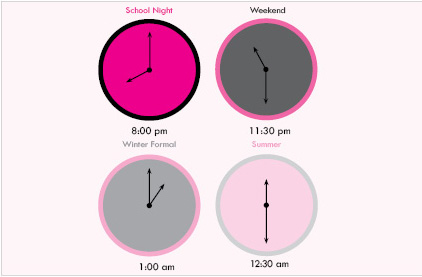
Every parent’s worst nightmare: the 12 a.m. call from a nameless, faceless police officer who has just arrived at the scene of a car accident. But it’s not just any accident. It’s their child’s. And it’s serious.
It is this vision that inspires many parents to inflict strict curfews on their children. Worrying about their child’s safety and well being, parents find many reasons to set limits on night time activities.
“My parents are definitely worried about my safety, but also my health. They want me to get enough sleep and be rested for the rest of what I have going on,” freshman Marisa explains.
While parents want their children to be home safe and rested, there is a clear tendency for parents to allow exceptions for special occasions, with 88 percent of Hockaday upper school students reporting that they have received curfew extensions for a school related or other special event.
“If Caroline has come from a school event or something like that or if she calls me and says, ‘We’re having a lot of fun. Can we have 30 more minutes?’ that sort of thing, I am willing to make an exception,” Loretta Hunt, mother of senior Caroline, says. “It’s not a hard and fast rule.”
Many students find that with honesty and open communication, an arrangement which both the parents and student can agree on emerges.
In fact, many Hockaday students and parents generally hold the same opinion on what makes a reasonable high school curfew, as approximately 78 percent of students and 67 percent of parents believe in a curfew between 11:30 p.m. and 12:30 a.m. While they may wish the curfew time was later, 86 percent of students say that their parents’ curfew is “reasonable.”
“My parents are pretty lenient. If I am out past 12 and haven’t contacted them, they get worried. But if I contact them then it’s fine,” says junior Fallon. “And I can pretty much go wherever I want.”
Often, planning ahead is the key ingredient for parental approval.
Kim Purnell, mother of sophomore Ali, says, “If Ali goes with someone who has a later curfew, and they’re going to be there past 11, she has to start thinking about how she’s going to get home in time for her curfew.”
In the event that open communication alone does not lead to a more lenient curfew, many Hockaday students resort to the art of persuasion.
Hunt explains that choosing her daughter’s curfew was a negotiation between Caroline, herself, and Caroline’s father.
“I started at 11. He said 11:30. And then I said 11 again. And then Caroline said one. So we landed on 12.”
Many students also find “on-the-spot” persuasion effective in gleaning a later curfew.
“Usually I try to argue about my curfew when I’m at the actual place and my mom’s about to pick me up in 30 minutes,” says sophomore Lauren. “I coax my mom a little bit, [and] I can usually extend it for about 30 minutes until about 11:30.”
Art of persuasion notwithstanding, some students choose to openly break curfew and receive whatever consequences that may result from their decision.
“If I don’t feel like arguing, I just come home later,” says sophomore Lilian. “My mom gets mad at me and I get grounded.”
Boarding students face a different set of challenges in the realm of curfew negotiation, or lack thereof.
Junior Maddie explains the difference between her rules at home and those in the boarding department.
“When I am at home, if I have something else going on, my parents will be more flexible. If there is a reason I need to get back later, that’s fine,” she says. “But in boarding, they just say, ‘No. This is your curfew. This is when you are back.’”
Approximately 35 percent of Hockaday students do not have a curfew, as many parents believe that letting their daughter determine for themselves when to come home will benefit them in college and later in life.
“My parents know that in college I won’t have a curfew, and they believe that coming home at two instead of twelve, when they are both already asleep anyways, won’t really affect anything,” says senior Blake. “As long as I eventually do come home, my parents don’t care.”
Alex Nowlin, Hockaday ’10, reflects on what she gained from not having a curfew in high school.
“I think that having independence and saying ‘Wait. I need to go home,’ gave me [self-]control that I still maintain,” she says. “I also know from experience that I don’t ever want to be driving when I’m tired or when it’s too late, because the crazies are out at night, and not that I don’t love crazies, but people are not paying attention as much to driving wisely and tend to be more unsafe.”
While every student is not granted this level of year-round freedom, as the summer rapidly approaches, approximately 64 percent of students do look forward to a less restricted curfew.
Maddie’s midnight school-year curfew is relaxed over the summer vacation.
“If I’m just out in the neighborhood, my parents will let me stay out until 12:30 or so,” she says. “It just depends on the situation.”
Whether it is summer or the school year, many parents stick with the rule that exercising patience and maturity ultimately leads to extra time out at night.
“As long as our daughter is respectful of our rules, her curfew can change. I think open communication is important,” Purnell says. “If she doesn’t get in trouble and honors her curfew, then we will allow her to extend her curfew when we see that she is ready to.”
—Hailey


